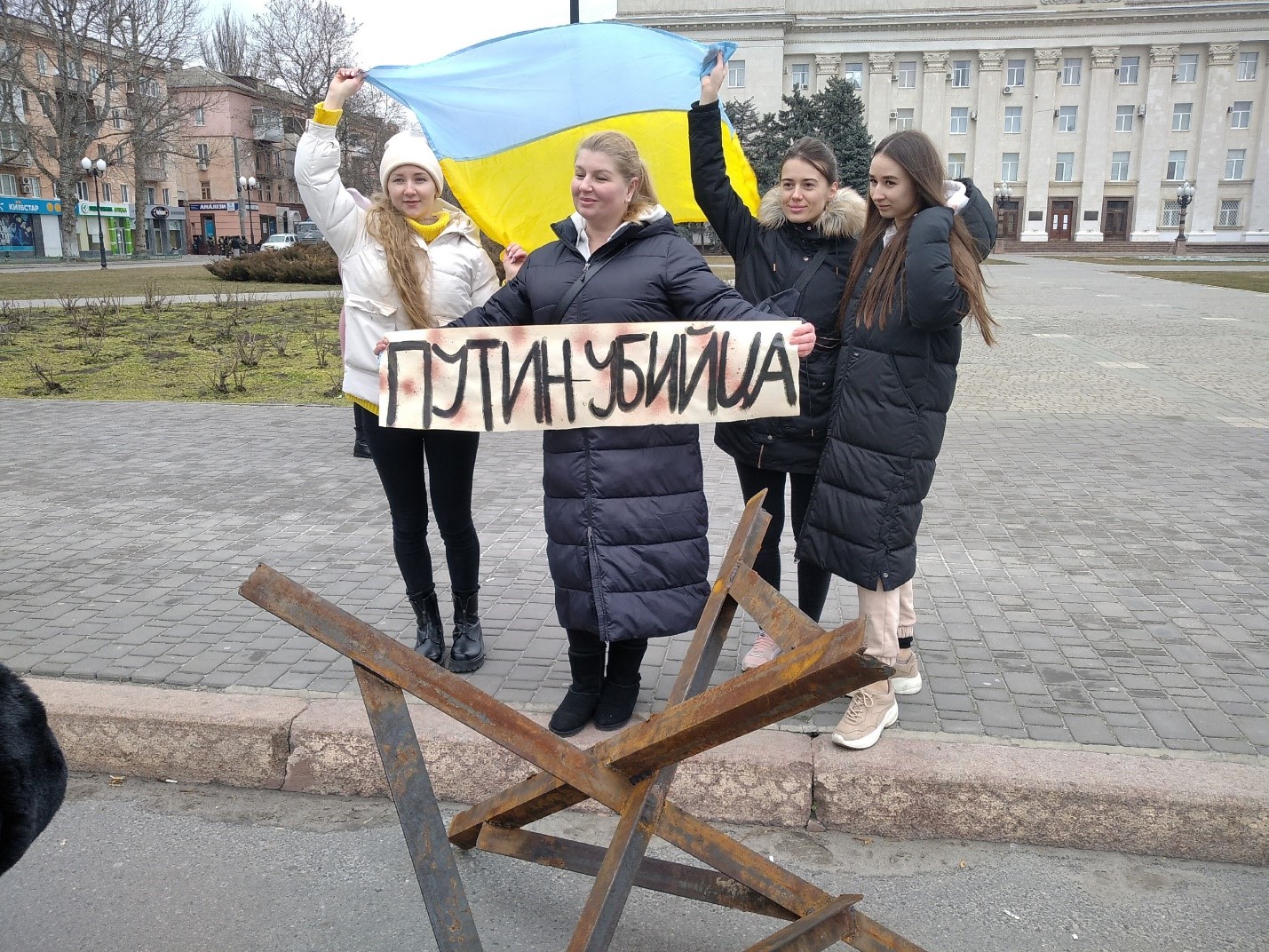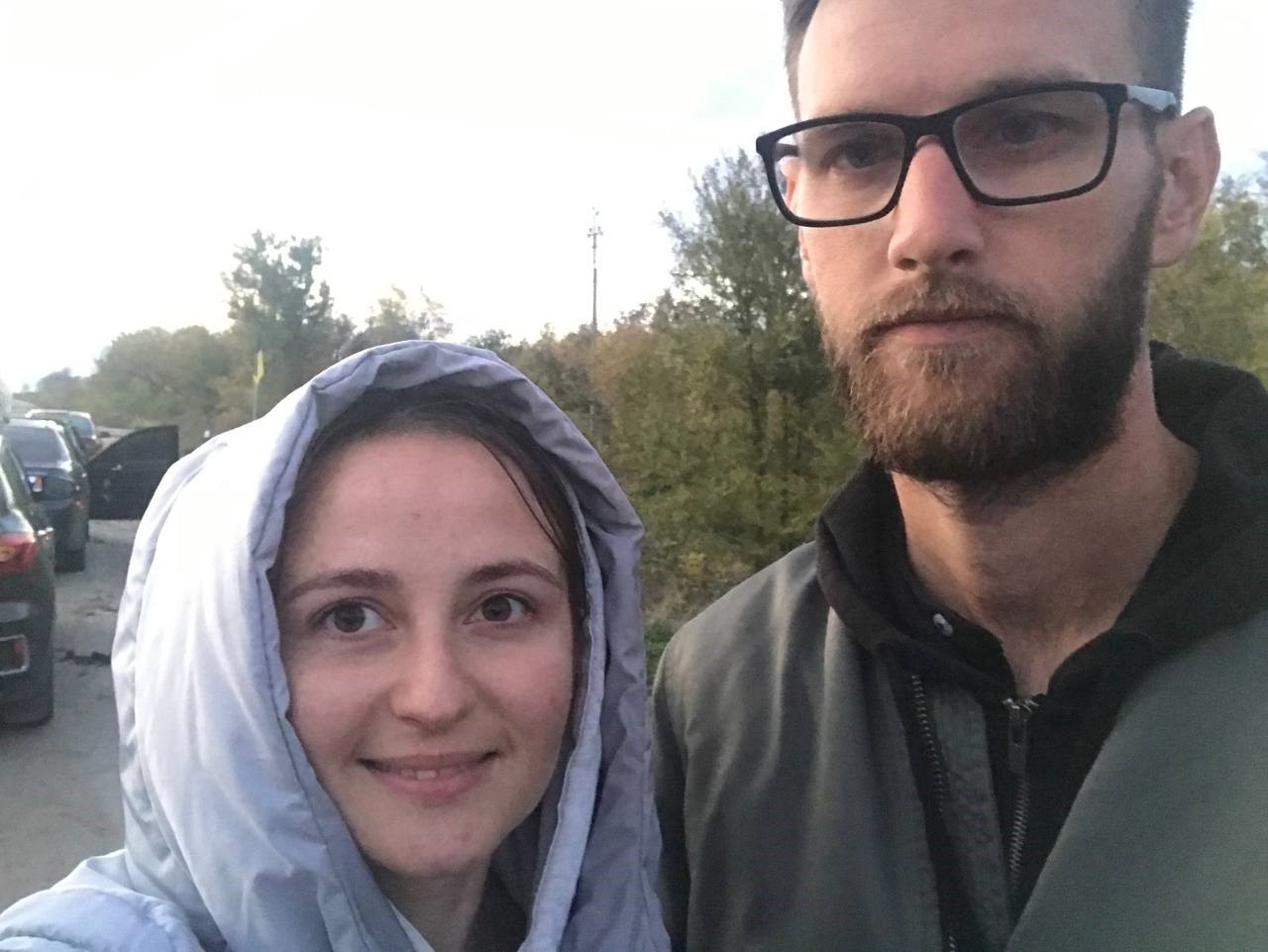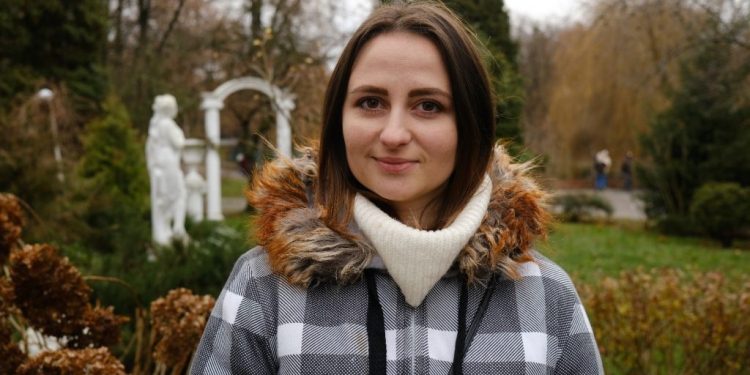For more than six months, Valentina Fedorchuk, a journalist from Kherson, lived under occupation, faced separation from her daughter, and worked under the constant threat of the enemy. When the war began, she decided to stay in Kherson to share the truth about life in the occupied city. However, after a pseudo-referendum, staying there became unbearable and extremely dangerous. She now shares her personal account exclusively for the National Union of Journalists of Ukraine.
“We understood that staying was dangerous, but leaving was even worse.”
Valentina, a 27-year-old journalist originally from the village of Borozinke in Kherson Oblast, had moved to the regional center a few years ago, where she worked as a journalist for the local TV channel VTV+. She had plans to switch to a job at a central TV channel and start her own project shortly before the full-scale invasion. However, due to the war, all those peaceful plans remained just notes on the page of February 24.
— The day before, we were doing live broadcasts, discussing predictions with experts about the start of the war. Many of my colleagues talked about it, and the media reported it, but no one believed it. I hoped until the very end that it wouldn’t happen. I thought there might be an escalation in the eastern part of the country, but I couldn’t even imagine that tanks would actually cross the Antonivsky Bridge. Then, on February 24, we woke up to a call from my husband’s grandmother. We didn’t even realize what was happening in our half-asleep state. Then we started flipping through the news and saw that the Russians had launched an offensive. That’s when my husband said, ‘Let’s go and fill up the car just in case.’ We went outside, and I saw grandmothers running with children and belongings to their cars – there was a terrible panic. We went to a gas station around 6 in the morning, but it was impossible to reach it. Long lines, terminals not working, explosions all around… After waiting for four hours, we returned home without refueling, — Valentina recalls the events of February.
But the most painful part for Valentina was realizing that her 8-year-old daughter wasn’t with her – at that time, her daughter was with her grandparents, just a few dozen kilometers away from Kherson. However, reaching there was impossible due to the circumstances.
— At that time, reports were already emerging that people were attempting to leave, but the occupiers were simply shooting cars with Kherson residents. We understood that staying was dangerous, but fleeing was even worse. When the Russian convoy was advancing across Antonivsky Bridge, I went live on Channel 5. It was terrifying to even talk about it, and comprehending the situation was nearly impossible. I was speaking, my husband held the phone, and people passing by would stop to listen. And I realized that I was telling them about how the Russians had broken through the city’s defenses, that the invasion had begun, something no one wanted to believe… It was very difficult to say, — our interviewee says, shuddering with memories.
In March, when Kherson was fully occupied, the local channel where Valentina worked entered into collaboration with the occupiers. This was a true shock for her as believing in this was as challenging as believing in the full-scale Russian invasion of Ukraine.
Since then, the persecution of media workers has begun.
— We heard that journalists were being hunted down and even abducted by the occupiers. This was very scary. There were rumors that they had lists to check those trying to leave. I was afraid of ending up on those lists. I decided to stay hidden and document what was happening behind enemy lines rather than risk getting caught at a checkpoint. It was important to work as a journalist because local people were capturing videos and photos of events, but they didn’t know how to share them widely. Then the protests began, and we wanted the world to know that the people of Kherson were resisting the enemy. One time, a video my husband secretly filmed actually helped save the lives of young guys who were captured by soldiers during a protest,— Valentina recounts.

Photo: Valentyna Fedorchuk
Despite the dangers and persecution of journalists, Valentina continued her work quietly for about six months. The most challenging aspect for her was being separated from her 8-year-old daughter, who had been evacuated to a safer place. Valentina felt the pain of being unable to protect and comfort her daughter during these difficult times.
— I was very worried when they were in the village because it was constantly shelled, communication was lost, Russian soldiers would come to their home… Eventually, they managed to leave. It’s terrible that our children have to grow up prematurely because of the war; they have to know what to do during explosions, how to hide when strangers with weapons come, — says Valentina. — I often received messages: ‘Mom, how are you? Just tell the truth,’ ‘Take care of yourself.’ Tears would come to my eyes in those moments. And once, my daughter called and said, ‘Mom, I dreamt that the war ended, and we were reunited!’ After that, I realized I had to go to her.
On September 29th, immediately after the so-called referendum, Valentina and her husband decided to leave their city of Kherson.
— At the beginning of the war, my husband and I decided that we wouldn’t stay here once they held the so-called referendum in Kherson. We witnessed how it all happened. Tables for voting were set up in parking lots, with soldiers overseeing the process. They even held votes at children’s playgrounds. Armed soldiers would enter apartments, and people voted under their watchful eyes. There was no notion of secret balloting. You could vote in one area and then go to another and do the same. Also, keep in mind that most residents had left the region – they definitely didn’t vote. So, speaking of any genuine referendum results is impossible. It was simply laughable (if not tragic). After the ‘results’ were announced, we realized definitively that we couldn’t live or work there, so we decided to go to our parents and daughter, — says the journalist.
However, leaving the occupied city wasn’t easy.
— We were held back for a long time. The occupiers did everything to prevent us from leaving. They introduced special passes which were impossible to obtain; even the Russians themselves didn’t know what these passes were supposed to be. Then they looked for excuses. We had to live and sleep in those queues for about two weeks. Later, we traveled to a neighboring village, where we rented a small house and swapped with other people to get some sleep. After a month, we were finally allowed to go through a check. They shook down all the cars and searched our belongings and suitcases. We laid out a blanket and emptied everything onto it. After they examined us, we were sent to the next FSB checkpoint, — Valentina explains. — They put more psychological pressure on us. They kept asking senseless questions like ‘Where are the nude photos on your phone?’ and similar things. They joked that ‘you won’t leave because your license plates aren’t right.’ It was like joking, but they were really toying with us psychologically.
After enduring lengthy checks, the couple was finally allowed to proceed. However, a new challenge awaited them: two kilometers of a mined road. The road had been washed out by rain, and they had to drive carefully. They noticed mines scattered along the roadside – a chilling sight. Despite the treacherous conditions, they pressed on, and when they reached the end of that road, they saw the first Ukrainian checkpoint and flag. Valentina shares, with emotion, that at that moment, they felt an overwhelming desire to thank the soldiers who had checked them, as if their journey had come full circle.

“I have the opportunity to go to Kherson and shoot footage to show the heroism of the people staying there”
In early November, the family was finally able to reunite. Valentina recalls that moment with tears in her eyes. No one could believe until the very end that they could escape from the occupation. But within a few days, the family received the news they had been hoping for – Kherson had been liberated.
— We were so happy! Can you imagine? We had just arrived, and in a matter of days, our city was freed! Of course, we didn’t rush back immediately; the timing wasn’t right. But I couldn’t just sit still. So a few days later, I went for an interview. I was hired to work for the local channel, and later, I managed to establish a connection with Channel 5, where I’m a correspondent now, — Valentina shares her news. In the span of nine months, she faced many challenges, but she never stopped dreaming.
— My dream was to welcome the Ukrainian Armed Forces to Kherson, but the city was wonderfully liberated even without our presence. And now, I finally have the chance to go there and cover stories: showcasing the bravery of the people who stayed behind, fought against the Russian occupiers, and reminded everyone daily that Kherson is a part of Ukraine. You know, it will be a great honor for me to share their stories, — Valentina Fedorchuk, correspondent for Channel 5, concludes.
This article follows the journey of journalist Valentina Fedorchuk from Kherson, Ukraine, as she navigates life during the war and occupation. Despite facing numerous challenges, including separation from her daughter and constant danger, Valentina remained committed to her work as a journalist. She documented events behind enemy lines and captured stories of local people’s resistance. The article touches on the difficult choices families had to make during the war and the relief that came with the liberation of Kherson. Valentina’s determination to share stories of bravery and resilience is a testament to individuals’ strength during times of war and uncertainty.
This series, titled Executed Free Speech, is created as part of a project Drawing Ukrainian And International Audience’s Attention To Serious Violations Of Human Rights And Crimes Against Journalists And Mass Media By The Russian Federation, which is performed by the National Union of Journalists of Ukraine, with support from the Swedish non-profit organization Civil Rights Defenders.
JOURNALISTS ARE IMPORTANT. Stories of Life and Work in Conditions of War is a cycle of materials prepared by the team of the NUJU with the support of the Swedish human rights organization Civil Rights Defenders.
#CRD

 THE NATIONAL UNION OF
JOURNALISTS OF UKRAINE
THE NATIONAL UNION OF
JOURNALISTS OF UKRAINE
















Discussion about this post